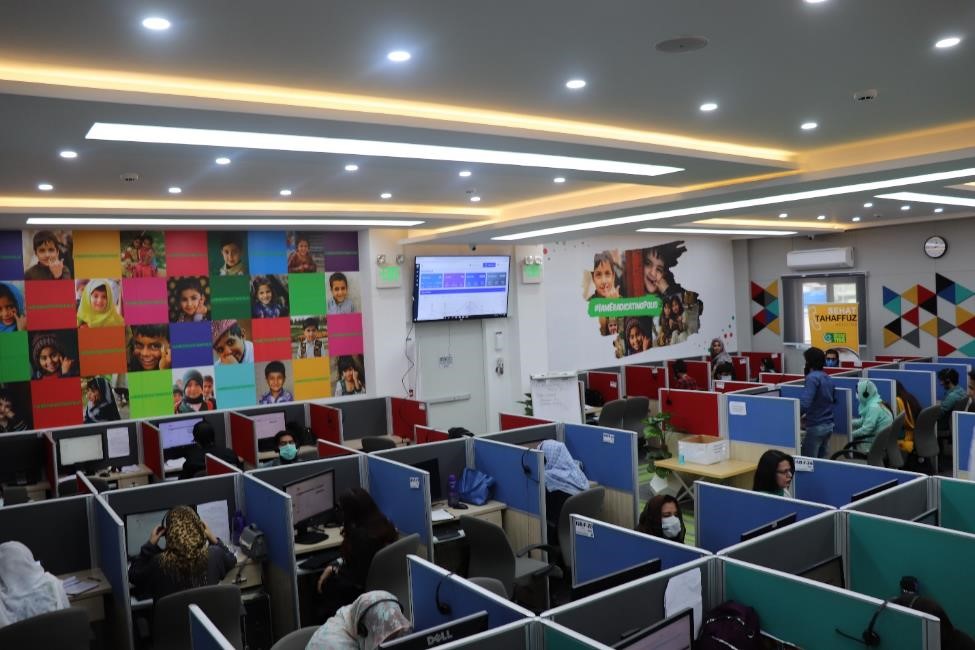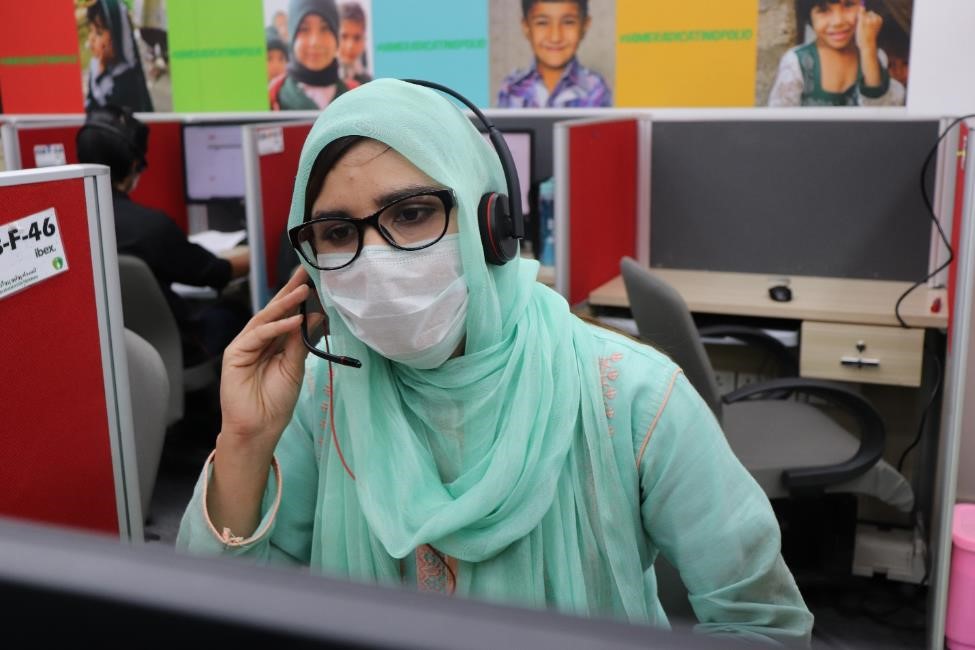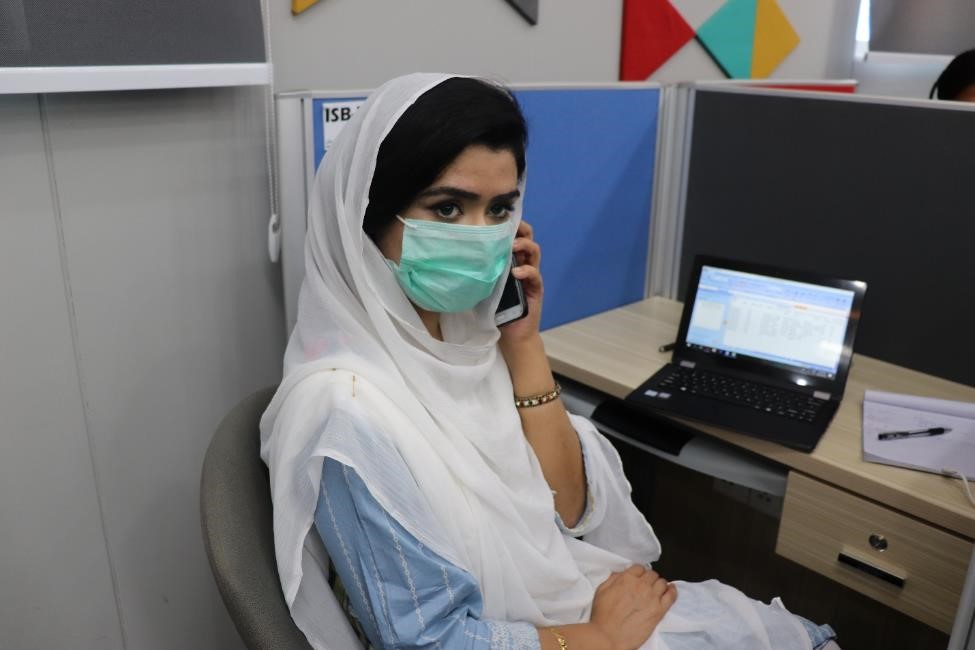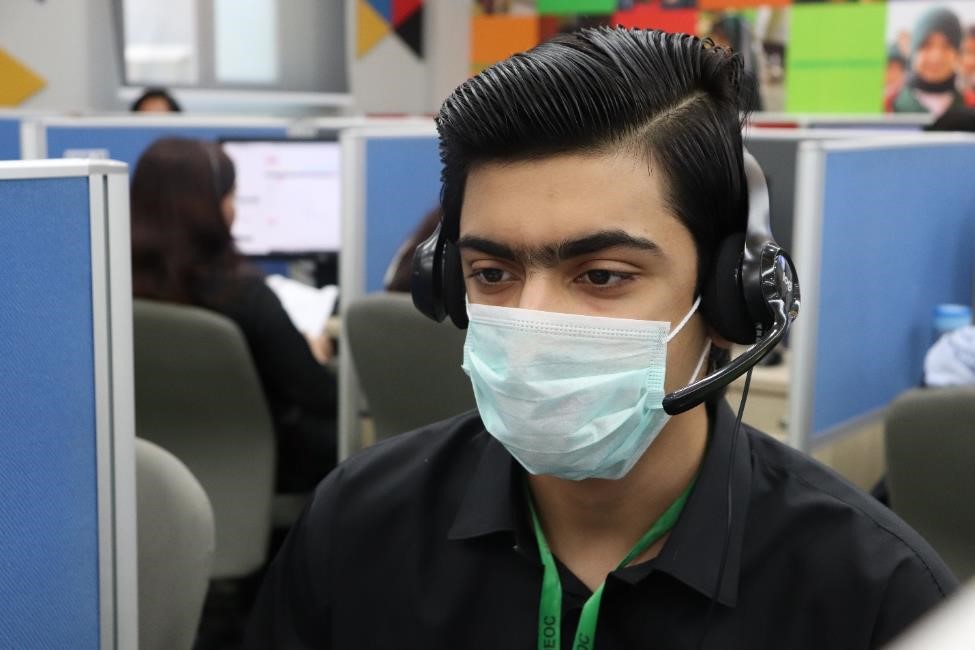“How can I help you?” “Have you travelled out of the country recently?”
“Please stay on the line. I am connecting you to a doctor,” said a young lady reassuringly to someone at the other end of the line.
The young lady is a call agent at the ‘Sehat Tahaffuz (Health protection in Urdu) 1166’ COVID-19 Helpline Centre at the National Emergency Operations Centre (NEOC) for Polio Eradication in Islamabad, Pakistan.
Sehat Tahaffuz 1166 originally started as a polio helpline to help parents and caregivers share concerns and access correct information about polio and other vaccines supported by UNICEF and partners. With the global outbreak of the COVID-19 pandemic, the Government, as part of its emergency response, expanded the center to help people get information on how to stay safe from COVID-19 and seek professional medical advice.
 Situated at the NEOC “Sehat Tahaffuz” Helpline 1166 connecting people and providing lifesaving information. Photo: UNICEF Pakistan/2020/Sharmin
Situated at the NEOC “Sehat Tahaffuz” Helpline 1166 connecting people and providing lifesaving information. Photo: UNICEF Pakistan/2020/SharminA vital support system during a difficult time
Like many other countries, the global outbreak of COVID-19 poses an enormous challenge to health services in Pakistan. The Sehat Tahaffuz 1166 call centre is increasingly becoming an important platform nationwide to listen to the concerns of people, provide correct information, and connect them to a doctor when required.
 Sadia Saleem (24), a proud Helpline agent. Photo: UNICEF Pakistan/2020/Sharmin
Sadia Saleem (24), a proud Helpline agent. Photo: UNICEF Pakistan/2020/Sharmin“I received a phone call from a 75-year-old man this morning. He was so scared and confused because of the Coronavirus situation. He asked if sunbathing could help him stay protected from the virus,” said Sadia Saleem, a twenty-four-year-old helpline agent. “I explained to him the symptoms of the virus, and the preventive measures. He seemed relieved and thanked me,” she added.
Sadia is one of the 250 call agents currently supporting the helpline which operates in shifts, from 8 am to midnight every day, seven days a week simultaneously from Islamabad, Karachi and Lahore.
“I’ve been working for the 1166 helpline since its inception. Its stressful work but I feel proud that I’m serving the people during this challenging time. In addition to receiving reliable information such as symptom of Coronavirus, contact information of the testing facility, cost etc. I think most people feel some comfort just speaking with someone from the health system,” said Sadia of her experiences.
More than 80 percent of calls received every day at the Helpline are related to basic information and symptoms of Coronavirus.
 Dr. Rabia Basri is one the six doctors stationed at the Helpline center, responding to critical calls with expert medical guidance and referrals. UNICEF Pakistan/2020/Sharmin
Dr. Rabia Basri is one the six doctors stationed at the Helpline center, responding to critical calls with expert medical guidance and referrals. UNICEF Pakistan/2020/SharminApart from the agents, the government has assigned six doctors to support the Helpline whenever required. Dr. Rabia Basri is one of them.
“I am forwarded calls that are critical and needs expert medical advice. Every day, I receive about 40 calls, some are as long as 20 minutes. These are difficult times for everyone. I often advise people about personal hygiene and physical distancing, and if they are having symptoms, help connect them with a hospital for the coronavirus test and further medical support,” said Dr. Rabia.
70,000 calls a day
“Initially, we were receiving about a thousand calls a day. During the National Polio Immunisation Campaign in February 2020 for example, people were calling to report missed children, clarify doubts about vaccines and lodge complaints when health and vaccine services were not working,” said Huma Shaukat, the Helpline Liaison Officer.
However, since the outbreak of COVID-19, the call volume has increased dramatically, to about 50,000 to 70,000 calls a day.
“Each call agent responds to about 150 callers a day. To increase the capacity of the helpline, 30 more agents have joined to manage the growing number of calls. We are even recruiting the youth like Daniyal Kiyani (20) and Nadia Qadeer (19) to support us during this highly challenging situation,” added Huma.
 Daniyal Kiyani (20) is a newly recruited Helpline agent committed to help people during this difficult time of COVID-19. UNICEF Pakistan/2020/Sharmin
Daniyal Kiyani (20) is a newly recruited Helpline agent committed to help people during this difficult time of COVID-19. UNICEF Pakistan/2020/SharminDespite adding more agents, the call volume has become unmanageable for the helpline centre. The situation has prompted the government to assign additional resources. The Digital Pakistan Iof the Prime Minister’s Office extended support to recruit an additional 165 agents while the National Institute assigned ten more doctors to the technical team.
Managing the 1166 helpline centre
At the helpline centre, television screens mounted on the wall display real-time information on incoming calls and graphical presentation of call volumes. Call agents sit inside cubicles in a hall with bright orange and green colored wallpaper and photographs of smiling children, portraying a positive atmosphere and reminding everyone of the purpose of the Helpline.
“Training and commitment of call agents are very important. Otherwise the helpline will not work,” said Huma. We have four supervisors managing the team of call agents and support them when required as the work here is highly challenging, especially now with the high number of calls every day,” she added.
All call agents undergo a comprehensive training on COVID- 19 basic information and primary symptoms facilitated by the National Institute of Health, followed by sessions on the helpline technology and interpersonal communication by a private firm that set up the helpline.
“We generate a daily report and share with relevant sections and the helpline management team. This is very important as it helps us review and manage problems, to continue functioning as an efficient helpline supporting people in their time of need,” Huma explained.
In the context of spreading coronavirus, all efforts are in place to ensure healthy work environment for agents- checking temperature at the entrance of the Helpline building, providing mask to all agents and ensuring enough supply of hand sanitizers are critical among them.
Under the leadership of the Government of Pakistan and the support of the Global Polio Eradication Initiative (GPEI) partners – United Nations Children’s Fund (UNICEF), World Health Organization (WHO) and Bill and Melinda Gates Foundation (BMGF), the Sehat Tahaffuz 1166 Helpline has become an essential support system for the people of Pakistan.
“GPEI partners are supporting the Government in utilizing existing polio eradication resources for the COVID-19 response in Pakistan. We are striving together to support as much as we can to ensure the health and safety of all children and families in the country during this challenging time,” said Dennis Chimenya, the UNICEF C4D team lead supporting the helpline in Pakistan.
As the COVID-19 spread, the Polio programme suspended all campaigns until June 2020 in Pakistan, however, all-out efforts will be undertaken immediate after post-COVID-19 to reach all children with polio vaccine.
